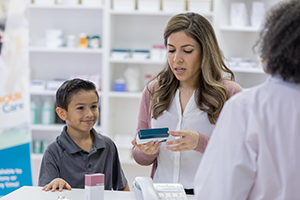New Studies Examine Effective Treatments for ADHD
ADHD Weekly, September 19, 2024

New studies and medication options to treat ADHD are rapidly evolving which may affect the treatment options you choose for yourself or your child. The US Food and Drug Administration approved a new ADHD medication that will be available in late 2024: Onyda XR, the first liquid nonstimulant medication.
Onyda can be prescribed for patients aged six and older as a standalone medication or for use with other medications to treat ADHD. The increase in medication options, especially nonstimulant medications, is especially important for those with co-occurring conditions who may not be able to take a stimulant medication.
Meeting needs and creating options
Newly approved medications can fill in the gaps when other medications are less effective or have intolerable side effects. The availability of more medications highlights the importance of medication management for ADHD symptoms. It’s also a reminder that ADHD doesn’t affect everyone in the same way, and that there’s not a one-size-fits-all approach to medication.
“In 2024 we have personalized medicine,” says Margaret Sibley, PhD. “It’s a good thing there’s a whole wide range and different delivery systems to help in finding the best fit for you.”
A member of CHADD’s professional advisory and editorial advisory boards, Dr. Sibley is an associate professor of psychiatry and behavioral sciences at the University of Washington School of Medicine and a clinical psychologist at Seattle Children’s Hospital. She has worked extensively with young adults who have ADHD.
Sometimes a child or adult will try a medication and it doesn’t work well for them. Then it becomes a matter of trying a different medication to find the best fit. Now there are many more options than we had even a few years ago.
Understanding good research
Along with increased medication options, there’s more ADHD research underway. But what to make of these studies? If you read any of these research studies, remember that not all use the same evaluation methods. It’s important to keep this in mind when deciding which type of treatment to pursue.
A recent review in the journal Pediatrics looked at 312 studies on different treatments for ADHD. This included medications, therapy, parent support, nutrition and supplements, neurofeedback, neurostimulation, exercise, alternative medicine, school strategies, and how doctors approach treatment.
The review found that although several treatments improved ADHD symptoms in youth, medication was the most effective. Dr. Sibley says this is a key takeaway from the review. “The impact that medication has on ADHD symptoms, this is the standard finding and it was also found in this study.”
Looking at the effectiveness of stimulant and nonstimulant medication, reviewers found that both improve ADHD symptoms. Stimulant medications significantly reduced ADHD symptom severity but did not largely improve things like academic or work performance and social skills. Nonstimulants, the reviewers found, significantly reduced ADHD symptoms and disruptive behaviors but did not improve academic or work performance and social relationships.
The reviewers also examined parent support, training programs, behavioral strategies, and support groups in studies of children aged three to eighteen. They found that these supports improved symptoms while school interventions in elementary and middle school did not.
It’s important to be aware this review compared some types of treatments together even though the methods used across the same category of treatment may have been different. For instance, not all parent training programs are the same; some use different methods, including self-paced online modules, or take place in a classroom setting or in a group setting with other parents. Parents should be aware of this distinction if they are trying to decide on a program, and research what methods the program uses.
Not all studies use the same criteria, and sometimes many types of interventions are grouped together and are not looked at separately, which may influence the outcome of the study.
“Interventions are diverse, so not all parent trainings, school interventions, and therapy are equal,” Dr. Sibley says. “Parents and adults must be discerning and make sure that what they are signing up for has some backing to it.”
She recommends visiting CHADD’s website [chadd.org] to learn about what makes a good parent training program if you’re looking for this type of treatment option. If you are considering a program offered through a doctor’s office, Dr. Sibley advises, “Ask what curriculum their program is based on in terms of helping kids in their daily lives.”
Further Reading:
- Medications Used in the Treatment of ADHD
- What to Ask Your Child’s Doctor About New Medication
- Behavior Strategies for Raising Kids with ADHD
- Parenting Skills and Behavior Regulation in Children with ADHD
- The Myth of ADHD Overdiagnosis
- Risky Behaviors Associated with ADHD
- Neurofeedback (EEG Biofeedback)
